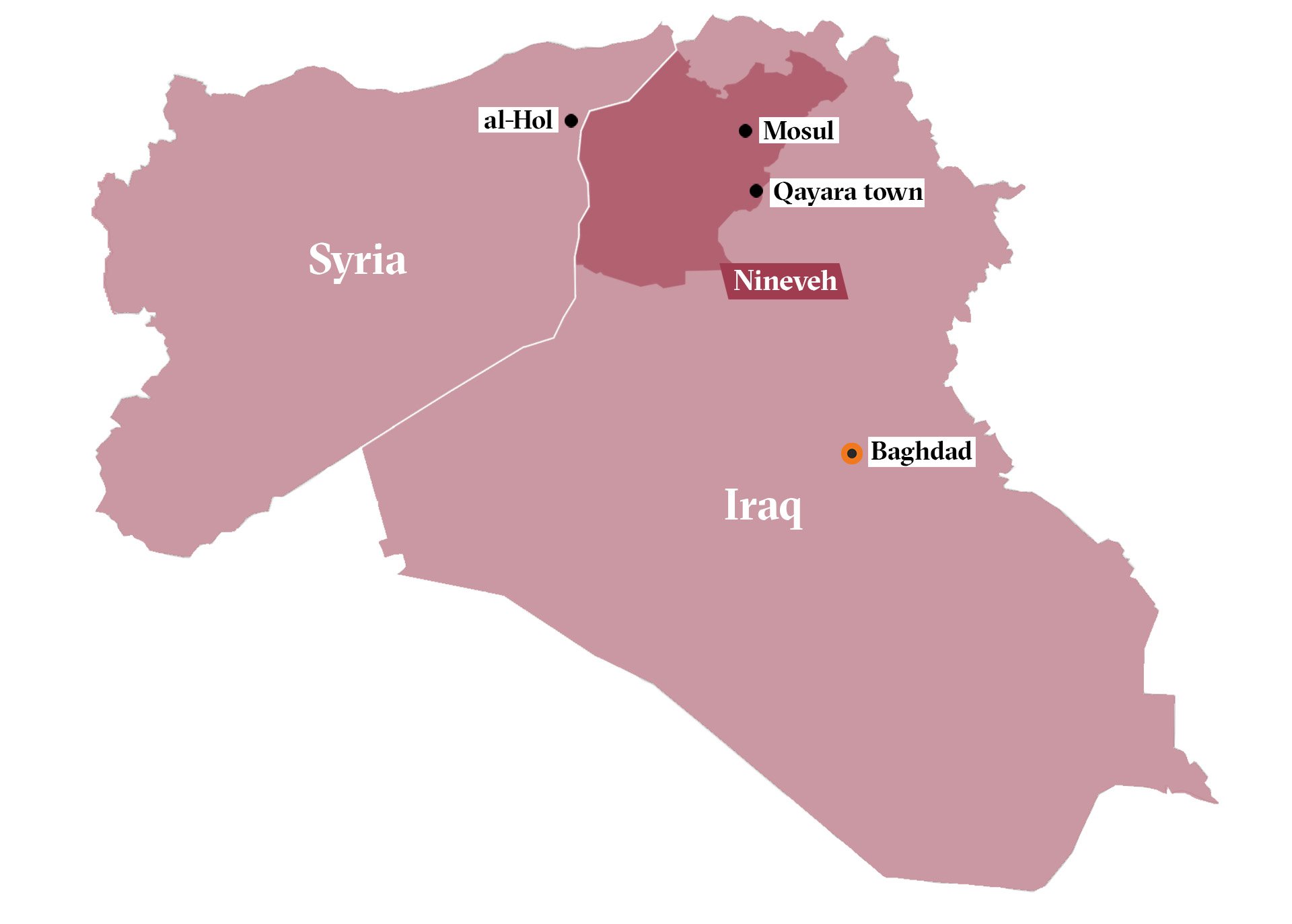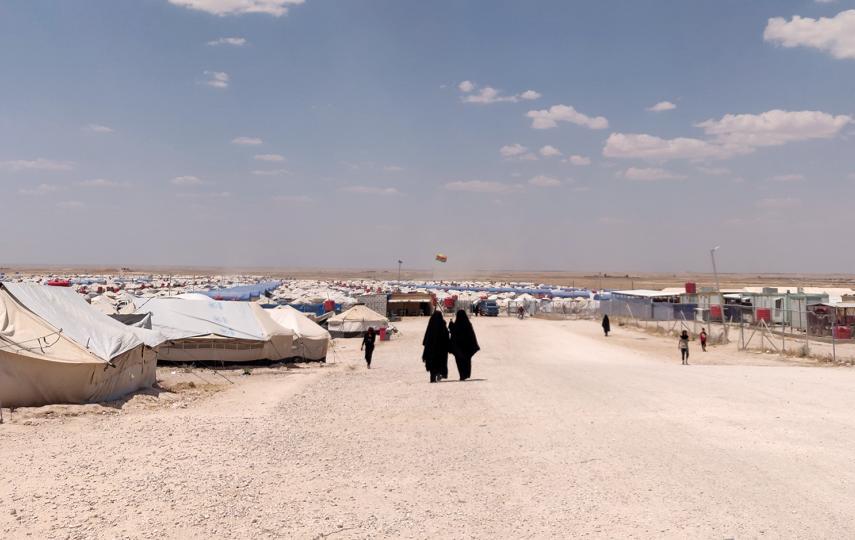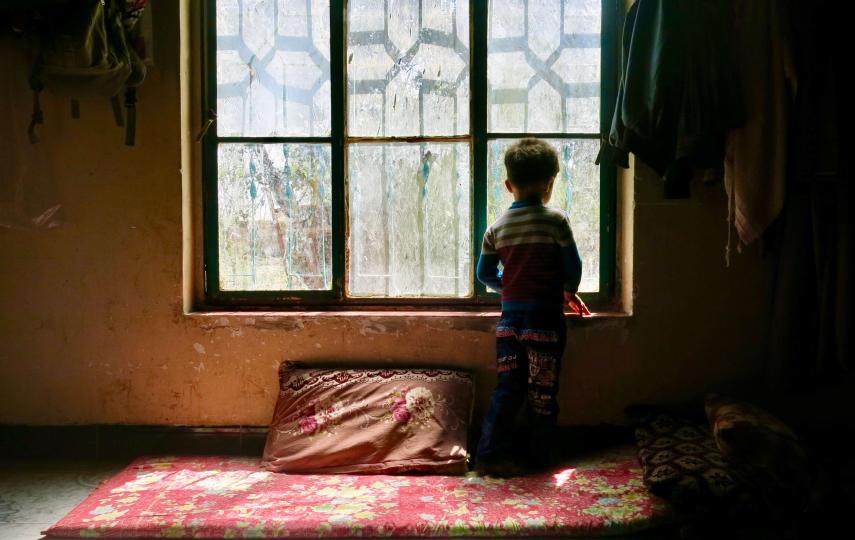More than 380 Iraqis were quietly repatriated last month from Syria’s al-Hol camp to northern Iraq – a test case for the future of up to 30,000 compatriots languishing in the notorious facility, which contains both supporters and victims of the so-called Islamic State (IS) group.
It was the first repatriation of Iraqis from al-Hol since the fall of Baghuz – the last IS stronghold in Syria – in March 2019, when tens of thousands of new detainees, many of them families of IS fighters, changed the dynamic of the camp, which lies close to the Iraqi-Syrian border.
During trips in May to both al-Hol and Iraq’s Jeddah 1 camp, where those repatriated are being set up in tents, The New Humanitarian found a process fraught with problems and a lack of transparency that raises questions about the feasibility of larger-scale repatriations.

Iraq’s government confirmed that the first 94 of 500 Iraqi families at al-Hol now cleared for return were transferred in May to the camp – located south of the city of Mosul in Nineveh province, in territory that was under IS rule for more than two years between 2014 and 2017.
The families are expected to be held there for several months – at least – before being allowed to return to their homes around Iraq. But there is heavy resistance from the local government, and from civilians in the area who suffered under IS and are resentful and fearful of returnees.
Al-Hol has been used to shelter Iraqi refugees on and off for three decades, starting with the 1991 Gulf War. But it didn’t receive much international attention until early 2019, when IS lost the battle for Baghuz and the camp’s population swelled as tens of thousands of people, considered to be IS families, were put inside, creating a giant, open-air detention centre.
Last month’s repatriation comes after several failed attempts.
While 5,000 people were sent back to Iraq in 2018, before the fall of Baghuz, returns then stalled, explained Mahmud Krro, deputy head of the committee of social affairs for the Kurdish-led Autonomous Administration of North and East Syria.
In 2019, the government announced it would repatriate more Iraqi families from al-Hol, but received pushback from humanitarians who said the plan to put everyone in a fenced-off section of an existing Iraqi displacement camp was unsafe and undignified, according to an aid worker who was not authorised to speak on the record.
Aid groups suggested dispersing al-Hol families throughout different camps to lessen the stigma, but the government rejected the idea and proceeded to close nearly all of Iraq’s camps.
Under increasing pressure to take back its citizens, in May, Iraq’s government restarted the repatriation, reopening the Jeddah 1 camp for returnees.
But challenges continued: The first attempt to bring the 94 families back in early May was halted the night before due to last-minute pushback from local authorities.
The situation was so sensitive that few people were willing to speak openly, but the 500 families cleared to return are believed to be from the pre-Baghuz era, deemed not to have strong IS connections – while several Iraqis still at al-Hol told The New Humanitarian they too had suffered under IS and now feel victimised all over again if they’re not allowed home.
There appeared to have been little if any attempt to raise confidence in the repatriation process in the community around the Iraqi camp, where people were reluctant to welcome back hundreds of people they feared might still be extremists. They also seemed unaware that the returnees had been vetted before leaving al-Hol, including by an Iraqi delegation.
“They are dangerous for us, because all of them were IS fighters,” Shakr Mahmoud, a 31-year-old who runs a shop near the Jeddah 1 camp in Qayara town, told The New Humanitarian. The Iraqi government, through its vetting process, says this is not the case.
“I don’t know why our government has brought them here,” added Mahmoud, who said he had witnessed atrocities under IS rule, notably the execution of an entire family – including four children – who had been trying to escape.
Mahmoud, and other Qayara locals, questioned why Iraqis from other parts of the country were being sent to a camp in Nineveh – many returnees are from Salah al-Din province, north of the capital, Baghdad; or from Anbar province, a huge expanse of western Iraq.
A silent (and risky) return
Conscious of community backlash and security concerns, Iraq’s government has kept the repatriation as low-profile as possible.
Aid workers familiar with the situation in Jeddah 1 told The New Humanitarian the returnees were transported at night. They said they were only given a few days’ notice, and that tent and food preparations were insufficient. Local officials said they weren’t warned at all.
Several humanitarian workers and local officials said the camps weren’t ready to receive people – unclean and lacking electricity, and without adequate food. There was also concern about gaps in the registration process: Two children arrived without parents, according to aid workers.
Iraq’s Migration and Displacement Ministry would give no timeline for when the other Iraqis who have been cleared for return – more than 400 families – would be transferred from al-Hol to Jeddah 1. The ministry also refused to be drawn on how long the returnees would have to remain in the camp. But Najm al-Jubouri, the governor of Nineveh, said he had been told by the central government that families would stay there for three months.
“I don’t like IS families returning to my province…The majority of these families are high-level people in IS,” al-Jubouri told The New Humanitarian, citing no evidence for this claim.
Al-Jubouri said victims who had suffered under IS shouldn't be forced to live in the same area as the extremists, especially because there’s still a culture of revenge, and because the security at Jeddah 1 isn’t strong enough to stave off any rockets that might target it: The camp is protected by a small number of soldiers and run by the government with support from UN agencies and other aid groups.
Even though IS has been largely defeated territorially, sleeper cells have become increasingly active in the last year, exploiting the lack of security in territory – like parts of Nineveh – that is disputed by the central government and the semi-autonomous Kurdish region in the north.
In May, at least 10 Iraqis were killed by IS in a coordinated assault near Samarra city, in Salah al-Din province. Months earlier, 32 people were killed and 110 wounded in the deadlilest twin suicide bombings in three years in Baghdad.
“Iraq remains the most pivotal area for IS. It’s the group’s centre of gravity. It must maintain a level of notoriety in Iraq to uplift the morale of its global affiliates,” said Laith Alkhouri, an intelligence adviser who has spent years analysing IS activities in Iraq and Syria. “The organisation has been resurging as a network of small groups in areas it previously operated in, which highlights its endurance in familiar enclaves and casts a shadow on claims it is defeated. IS is trying to make a strong comeback, contravening Iraq’s and the US’ security goals.”
‘Collective punishment’
The government would provide no information on what deradicalisation or reintegration programmes were in place to ease community tensions, nor would it outline what steps would be taken for gradually releasing returnees from al-Hol back into Iraqi society.
The New Humanitarian reached out repeatedly and sent detailed questions to Iraq’s minister of migration and displacement, but received no response. Less senior officials would only speak in general terms about the process.
“If there is rehabilitation, tribal reconciliation, and approval from clans for people to return, [and] when there is the availability of suitable housing, they will return,” said Karim al-Nouri, undersecretary for the ministry of migration and displacement. “They will return only after full social rehabilitation. We do not have to rush their return.”
Al-Jubouri, the Nineveh governor, said he too hadn’t been given any details about reintegration and reconciliation programmes, nor any information about what would happen to returnees after they left Jeddah 1.
According to an internal draft of guidelines compiled by the UN to govern its engagement with returnees, the Iraqi government is being urged to ensure that any camps remain civilian in nature. According to the draft, seen by The New Humanitarian, this includes assuring them freedom of movement – taken to mean inside the camp as residents do not currently have permission to leave.
Given the “high potential for stigmatisation and opposition from local tribal and political figures”, due diligence should be conducted to ensure that returnees don’t face rejection or harm from communities, the draft said.
Belkis Wille, senior crisis and conflict researcher at Human Rights Watch, criticised the Iraqi government for treating returnees as de facto criminals just because they potentially had relatives who had joined IS. She described it as a form of “collective punishment”, and said it risked creating more anger and permanently stigmatising these families.
“The government approach is to take these families… holding them against their will in an open-air prison which doesn't allow for the family to come and go freely,” said Wille. “If the approach had been about protecting people, [the government] would have seen where families felt safest and would have facilitated that for them, and wouldn't have used any form of coercion to put people in specific places or hold people in specific places.”
Apart from Jeddah 1, only two other displacement camps remain open in Iraq outside the semi-autonomous Kurdish north. One is Jeddah 5, which is located a five-minute drive away from Jeddah 1 and contains 1,200-1,500 families displaced by conflict within Iraq.
In a bid to end the prolonged displacement of nearly 35,000 people, the government announced a raft of closures last October, and 16 of Iraq’s 18 camps were shut by January. But many families haven’t been able to return home due to documentation problems, fear of being evicted by security forces for perceived IS affiliations, or the lack of a house to return to because it was destroyed, according to Human Rights Watch.
Dangerous, but hard to shut down
Pressure is mounting from both the US-led coalition and the UN to close al-Hol, which is seen as a growing security threat in northeastern Syria and the wider region.
The camp contains an estimated 60,000 people from more than 50 countries – including 30,000 Iraqis, 20,000 Syrians, and around 10,000 others from around the world. Camp officials say it is a breeding ground for extremism, especially as nearly 20,000 of the Syrians and Iraqis are reportedly children.
Local officials, security personnel, and aid workers told The New Humanitarian that violence in al-Hol has escalated in recent months, with people being killed by IS sleeper cells suspected of going against the groups’ ideology. At least 47 people have reportedly been killed in the camp this year.
Local officials and security forces routinely refer to the camp as a ticking time-bomb that is creating a “new generation of jihadists”, said Kino Gabriel, spokesperson for the Syrian Democratic Forces (SDF), the Kurdish-led group that controls security in northeast Syria and is backed by the US-led coalition. In March, the SDF arrested 125 jihadists in the camp who were coordinating attacks and smuggling people out, said Gabriel.
Aid workers at al-Hol told The New Humanitarian that the insecurity hampers their ability to provide assistance in the camp – their movement is even restricted as certain areas are deemed too dangerous to venture into.
But many countries are reluctant to take back citizens suspected of fighting with IS. Only 25 nations have repatriated people from northeastern Syria, according to Human Rights Watch, and most have been to Kazakhstan, Kosovo, Russia, and Uzbekistan.
“If I had a choice, I wouldn’t stay for even a day.”
The United States has repatriated most US nationals, but European nations have so far refused to commit to large-scale repatriations. Australia, Denmark, and the UK have even stripped citizenship from some of their nationals, rendering them stateless in certain cases.
Syrians wanting to leave used to need a local guarantor to vouch for them. But since a policy shift in October making it easier for Syrians to go home by the Syrian Democratic Council (SDC), the SDF’s political arm, more than 2,000 have left al-Hol.
The Kurdish-led Autonomous Administration of North and East Syria, which controls the territory where al-Hol is located, is urging the international community to take back its people, especially the Iraqis, which make up half the camp’s population.
But Iraqis who have already spent years living in squalor in al-Hol told The New Humanitarian they didn’t want to leave one camp just to enter another.
“I’ll be upset if I have to stay in the [Jeddah 1] camp for a long time,” said Ali Abo Hussein, a 57-year-old who said he fled to Syria with his wife and four children from Nineveh province in late 2017. “If I had a choice, I wouldn’t stay for even a day,” added Hussein, who is on the cleared list to return from al-Hol but hasn’t been given a date yet.
Alif Jasem, a 23-year-old who said she fled IS-occupied Mosul in the middle of the night with 18 other people four years ago, was nine months pregnant when The New Humanitarian visited al-Hol.
She wanted to give birth in Iraq, but hadn’t yet registered to return. She said she was worried that people in her home community who didn’t know her would think badly of her because of where she was returning from, adding: “I escaped to save my life, and suddenly the name al-Hol equals Islamic State.”
Difficult future for returnees
Aid groups are concerned that while the government says the camps are temporary, the lack of a plan to move people out could mean people are there for much longer, furthering their stigmatisation by suspicious local communities and making it harder for them to reintegrate.
There’s also concern that to appease the public, the government will force returnees into deradicalisation programmes, which change the nature of the camps from humanitarian to more restrictive settings – with aid perhaps becoming conditional on positive progress. A draft internal document sent to aid groups from Iraq’s government in April, titled “psychosocial rehabilitation program for terrorist families”, laid out a suggested four-stage programme to reform, evaluate, and diagnose causes that encouraged extremism.
“The longer there is no plan for a population in the camp, the more likely there will be coercive rehabilitation programming, that attend[s] to some public opinion demands [such as] the deradicalisation of people, while their basic needs aren’t even met,” said one aid worker with knowledge of the repatriation who wasn’t authorised to speak on the record.
Aid groups working with the UN and the Iraqi government to support the repatriations say it’s crucial the authorities are more transparent about the process, and that returning Iraqis have access to services – like health and education – just as any other citizen does.
“Families who have languished in limbo in al-Hol camp in Syria now returning to Iraq deserve a solution to their displacement and an end to this prolonged uncertainty,” said one senior aid worker. “Options of returning to areas of origin or resettlement in other areas should be made available to families not suspected of crimes who wish to leave displacement camps.”
But all the Iraqis The New Humanitarian spoke to – including three officials and three local people – indicated it would take a long time for communities to become more welcoming, if it happens at all.
Some people in Nineveh said they were already seeing worrying signs from the few families who have returned from al-Hol.
Ahmed Abdulla, a soldier with the Popular Mobilization Units (PMU), an Iraqi government-sanctioned paramilitary force backed by Iran, said some women and their children had shouted at him as he welcomed them at Jeddah 1.
“The women said, ‘you are an infidel’, and said we’re going to come back like a new Islamic State,” said Abdulla. “[These people from al-Hol will] never change, because of their ideology. If we don’t kill them, they’ll kill us.”
Additional reporting by Jamal Mohamed Bali, Lucas Chapman, and Barzan Jabar
With local reporting support from an individual whose name is being withheld due to security concerns
sm/ag






